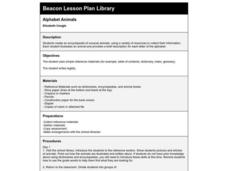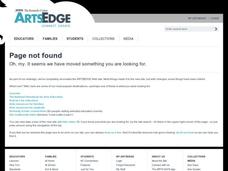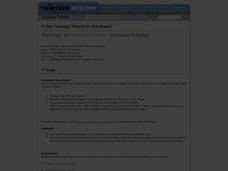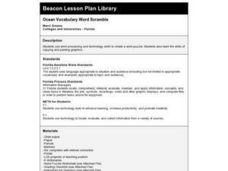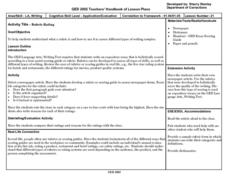Curated OER
Alphabet Animals
Second graders create an encyclopedia of unusual animals, using a variety of resources to collect their information. Each student illustrates an animal and provides a brief description for each letter of the alphabet. A very nice,...
Curated OER
Vocabulary from The Outsiders
Students listen to audio tape of segment of novel, The Outsiders, practice using online dictionary to look up and define vocabulary words, and create list of terms in Microsoft Word document.
Curated OER
A New Word Everyday: The Hobbit
Learners record unknown vocabulary they encounter while reading The Hobbit. In this "A New Word Everyday" instructional activity, after students record unknown words, they must use a dictionary to find the correct definition and write...
Curated OER
Applying Decoding, Vocabulary, and During Reading Strategies
Apply reading strategies to boost phonemic awareness. While reading a provided informational text, learners use decoding, vocabulary, and a graphic organizer to strengthen their overall reading ability. Handouts and the reading passage...
Curated OER
Snowflakes
Young scholars read "The Snowy Day," by Ezra Jack Keats and construct snowflakes to decorate the classroom walls. They examine how snowflakes are formed and study new vocabulary words.
Curated OER
Dalai Lama Peace and Conflict Resolution
First graders explore the Dalai Lama teachings on peaceful conflict resolution. They discuss how actions and words affect others. Students sing action songs about peace. They create a stick puppet to enhance discussions about conflict...
Curated OER
Totally Trivial - B
High school pupils can hone their research skills by using the Internet to find the answers to the questions presented in this on-line worksheet. This resource focuses on questions whose answer begins with the letter "B."
Curated OER
Our Savage Planet in the News
Students explore extreme earth phenomenons. In this savage planet lesson, students explore and report on various types of severe weather and earth phenomenons using the Internet, a word processor, or other multimedia device.
Curated OER
The GED Test: Who Passed?
Students examine the importance of reading with understanding in order to pass the GED. For this literacy lesson, students discuss how important reading for understanding is in order for them to pass the GED. Students also calculate...
Curated OER
Desert Views - First Impressions: Travelers on the Gila Trail
Learners draw animals and plants that are described to them as they read passages of people who traveled across the Gila Trail in the Southwest. In this Gila Trail lesson plan, students also write a letter describing a plant or animal in...
Curated OER
Ocean Vocabulary Word Scramble
Students visit a puzzle maker website and follow a list of instructions, creating a word scramble using sea animal vocabulary. They copy and paste graphics at the bottom of their puzzle, and print them out for other students to solve.
Curated OER
Coastal Landforms
Students explore landforms. Using the internet, students research the main landforms. They define landforms and download images into a word document. Students create their own picture-dictionary.
Curated OER
It Looked Like Spilt Milk
Class rereads book It Looked Like Spilt Milk and reviews what a good sentence looks like. They look at websites which contain cloud pictures and then use their imagination and draw on the computer their cloud pictures.
Curated OER
ESOL Competencies
Students examine the want ads to determine their organization. They discuss a list of vocabulary generally associated with employment. They write a job announcement for a company of their own. They discuss resources other than the...
Curated OER
Glossary, Index, and Table of Contents
Fourth graders use two separate sources to learn about index, glossary, and table of contents usage. In this library lesson, 4th graders use two books, Learning About Weather with Graphic Organizers, and The World Almanac for Kids, to...
Curated OER
Rubric Rating
Students develop a rubric or scoring guide to assess newpaper articles. They rate the story and write the reasons for the rating. An Essay Scoring Guide is attached for reference.
Curated OER
Functions and the Vertical Line Test
Students explore the concept of functions. In this function lesson, students determine if the graph is a function by using the vertical line test. Students use an applet to explore the vertical line test on a variety of graphs.
Curated OER
Paint My Counties: Map Coloring the Counties of Arizona
Fourth graders identify the counties of Arizona. In this social studies lesson, 4th graders color a county map of Arizona using the fewest number of colors possible. Students write a persuasive paragraph.
Curated OER
The Collection
High schoolers consider the impact of museum collections. In this global studies lesson, students read an article and contribute to group discussions that analyze what a collection is. The article is not included with the lesson.
EngageNY
Mid-Unit Assessment: Text-Dependent and Short Answer Questions: Excerpts from “A Limited Supply”
There's no such thing as an unlimited resource. Scholars complete a mid-unit assessment by reading A Limited
Supply. They answer text-dependent questions and complete a graphic organizer about key terms in the text.
Houghton Mifflin Harcourt
Silly Stories: Challenge Activities (Theme 1)
This packet, the first in the series of support materials for the Houghton Mifflin Harcourt thematic units on silly stories, contains enrichment activities for learners who have mastered the basic concepts of the lessons.
Curated OER
Online Words
Students use an online dictionary to discover the meaning of vocabulary words. The use of the internet is a skill that is developed for the integration of technology into the curriculum.
Curated OER
Vocabulary of Ancient Rome (Grades 6-8)
Students define ancient Roman vocabulary using the dictionary writing sentences. They write sentences for each word that use the words in their original and contemporary contexts.
Curated OER
Being a Good Detective
Students examine a variety of reference resources when seeking information. They discuss atlases, almanacs, dictionaries, encyclopedias, thesauri, online search engines for the Internet, and online library card catalogs. They complete a...


